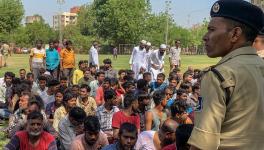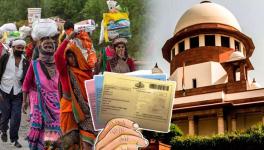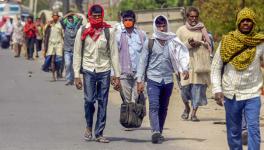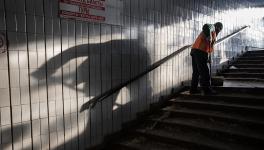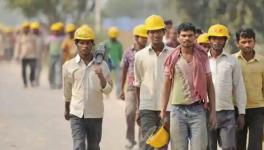Challenges of Administrative Transitions Affect Migrant Workers the Most
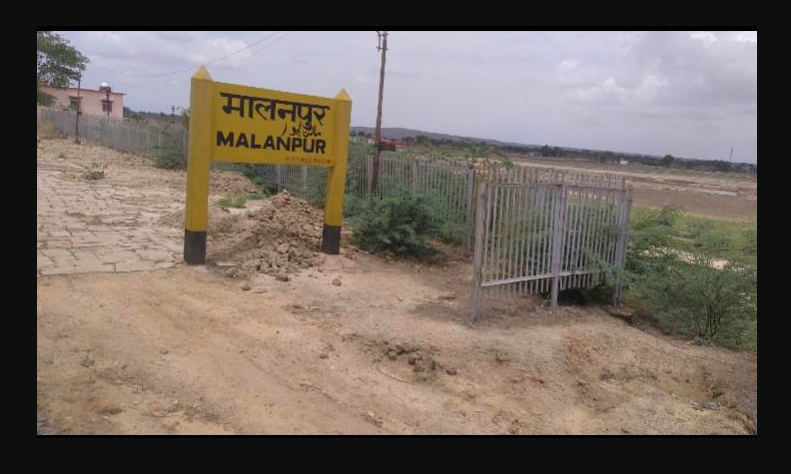
Seema hails from the Sahariya community (a Particularly Vulnerable Tribal Group or PVTG). She migrated from Dabra to Sahariya Basti in Malanpur, an industrial town located in Bhind District of Madhya Pradesh, along with 25 other families searching for better opportunities. They secured employment as daily wage labourers in industries located in and around Malanpur. But why, Malanpur? To understand this, one has to take a closer look at the promises that an administrative transition holds by juxtaposing them to reality.
Malanpur was in the initial stages of getting converted from a Nagar Panchayat to Nagar Parishad during early 2021. The administrative transition of Malanpur (under Article 243Q (1) (a) & (b) of the Indian Constitution) is one that can be categorised as a shift from a rural-urban area to a small urban area, i.e., from Nagar Panchayat to Nagar Parishad or Municipal Council. The promise of this shift was better public infrastructure, smoother administration, better access to entitlements and employment opportunities. The prospect of this transition, combined with the bee-lining of industries that offer employment to informal workers, encouraged Seema and many others like her to migrate here.
Municipal Councils are constituted for small urban areas, and Nagar Panchayats are formed for transitional areas, i.e. an area transitioning from rural to urban areas. The Governor may (under Article 243 Q (2) of the Constitution of India), having regards to many factors like the population of the area, factors of economic importance, etc. by public notification for the purposes of creating municipalities and specify areas as a transitional area, a smaller urban area or a larger urban area. The need to do this in Malanpur was felt because of the industrial boom in the area, which brought in more industries, and with it, informal migrant labourers.
These kinds of administrative transition periods are particularly difficult for informal workers (even more so for migrant workers), who make up the largest percentage of India’s workforce and are dependent upon government entitlements for their social security. One of the major challenges is the lack of clarity surrounding the physical location and the concerned department responsible for processing claims (like pension, birth/death certificate, etc.) and assisting in the grievance redressal procedure.
Almost all the members in the Sahariya basti of Malanpur, including Seema, have their respective Aadhar cards with their old residential address (either Dabra or otherwise). Some of them migrated much earlier and have been living in Malanpur for over 30 years without possessing any form of State recognised identification or support to procure them. Out of the total population of 60 members, only three members in the Sahariya Basti have their voter identification to date. Since their Aadhar cards don’t show the updated address of their current place of residence, they face significant barriers in receiving various government entitlements. The next generation (children and youth) also faces the same issue, creating significant school admission and employment challenges. For accessing entitlements like domicile certificate, ration card, pension or caste certificate, Aadhaar details must be updated with their current Malanpur address. Updating the Aadhaar card and linking it to the current (and functional) phone number are two of the biggest hindrances that cause delays in availing government schemes. This challenge is increasingly faced by migrant workers (inter-state and otherwise) as they tend to change their phone numbers for better network connectivity and other reasons.
The government body responsible for providing support for Aadhar related entitlements is Aadhar Seva Kendra (ASK). Throughout Madhya Pradesh, there are only three ASKs - one located in Indore and two in Bhopal. Despite the administrative transition, there are no ASKs or functional alternatives to serve this purpose in Bhind district (where Malanpur is located). As a result, the public is pushed to choose options that are most often highly exploitative. Seema had to recently pay INR 600 just to get her Domicile certificate (with Malanpur address) which is a pre-requirement for many other entitlements. She had to sacrifice her hard-earned two days worth of wages to procure a document that the government ought to have facilitated free of cost. Adding to her challenge was the ambiguities caused due to the administrative transition. In this phase, the only accessible mechanism for grievance redressal was the Municipal Council, which became fully functional only in the latter half of 2021. Before that, the administration seemed to be washing their hands off this responsibility citing transitional stage challenges for almost a year.
Although the problems faced by Seema are reflective of structural barriers, the added layer of challenges here comes owing to the transition phase of Malanpur and the lack of clarity that existed over institutions and mechanisms responsible for entitlement facilitation processes. This transition was sanctioned through a Gazette notification passed four years ago (on October 4, 2018) by the Urban Development Department. Under this notification, six villages were said to be transformed and subsumed into a single council, i.e., Malanpur Municipal Council. The villages to be subsumed were - Malanpur, Hariram Ki Pura, Khuman Ka Pura, Kachura Ki Pura, Singawari, Girongi, and Tilori. These villages were earlier under the jurisdiction of four panchayats located in Gohad tehsil of Bhind district, where administrative work and entitlement facilitation happened. The government body responsible for development and maintenance is the MIDC (Madhya Pradesh Industrial Infrastructure Development Corporation, formerly known as AKVN Gwalior). Upon interaction with the local community, we came to know that despite the establishment of the MIDC, the community continues to face access to housing and water issues.
When the ruling government changed in 2019, there were many uncertainties revolving around the decision to transition Malanpur into a Municipal council. These uncertainties had and continue to have significant implications for the local community in terms of approaching the appropriate government body for the delivery of public services. For example, a decision regarding delimitation was not taken for the longest time because the new government could not agree upon whether Malanpur falls under the category of a rural or urban area. At that time, the Collector in power asked the CEO and Asst. CEO of the district panchayat requested permission from the Panchayat Department of the state regarding delimitation, but the decision was left hanging for a prolonged period. The effect of this non-decision meant that the administrative bodies who played a crucial role in the entitlement facilitation remained withdrawn from it.
There were also no intermittent arrangements made for the general public who wished to avail public services during this transition phase. They were hassled from one office to the other without clarity. It was only towards April 2021 that the handing over of documents and assignment of positions from panchayat to municipal council started happening.
Till June 2021, the only readily accessible option (for applying to entitlements) was MP Online Kiosks set up by private stationery/xerox shop owners. Upon interaction regarding its functionality, some workers in the area alleged high processing fees and fraud being charged to them. The workers also informed that the kiosks do not render support in follow up processes and remain unaccountable for delivery of entitlements.
On-ground Challenges
COVID was a significant setback for the rural to urban transition process, especially with government offices working in minimal capacities. As a result, the transition process was neglected and the departments gave priority to facilitating immediate health needs amidst spiking COVID cases. Only after the second wave, the office of the Municipal Council became active. It slowly started taking over and facilitating the entitlements work. Starting August 2021, the Chief Municipal Office (CMO) office at Malanpur took over to supposedly facilitate the transition process expeditiously.
As a consequence, the Sarpanch and Secretary, who were earlier responsible (albeit partially) for signing letters and facilitating entitlements during the transition phase, were no longer involved.
However, the catch was that the CMO office, despite taking over the responsibilities, was not equipped in terms of infrastructure to carry out the entitlement facilitation process. One positive measure is that a Lok Sewa Kendra office (established under The Madhya Pradesh Lok Sewaon Ke Pradan Ki Guarantee Adhiniyam, 2010) was started recently next to the CMO office for entitlement facilitation. Caste, income, and domicile certificates, and other entitlements for which the people had to earlier travel to Gohad, could now be obtained in Malanpur (except land records and notary related entitlements).
It has become somewhat clear that CMO Office would be the only governing and executing body in Malanpur at the moment. All the departments, like the Public Health Engineering (PHE), Education, are yet to establish their offices in Malanpur.
Following this, it is important to highlight a democratic challenge that the Nagar Parishad faces -- its inability to function as a wholesome independent body as the counsellors of the 15 blocks have not been elected yet. The counsellors further choose the President who heads the office of Nagar Parishad - also something that is in the hanging now. The election process, which includes division of wards, reservation of seats, and release of notification, was supposed to have happened by late 2019. However, even by the mid-2020s, there was no sign of movement, and it became clear that the election process would start only when Covid-19 cases fall. By November 2020, the Election Commission decided to reserve 12 out of 15 wards for candidates who were women, SC, ST and OBC, and conduct the election.
This decision (to reserve wards as mentioned above) was challenged in the Madhya Pradesh High Court at Gwalior as it violated the 50% reservation policy. Further, the Madhya Pradesh High Court (through an order passed under W.P No. 20262/2020) on December 1, 2021, declared the decision invalid and asked the election commission to do a fresh allocation of seats as per the reservation policy. Despite this, there is a sense of further delay in the elections because the Panchayat elections followed by the Vidhan Sabha elections are scheduled in the coming months. Our experience-based assumption is that the election commission will now schedule the Municipal Council election only after Panchayat and Vidhan Sabha Elections. As it stands, the polls in Malanpur Municipal Council will only take place in 2023, resulting in inordinate delays. Until elected members are chosen, the Nagar Parishad will be operated by the office of the CMO solely, which adds to the challenges in entitlement facilitation processes.
Another major issue that the people of Malanpur have been facing is the inaccessibility of Aadhaar Kendras set up by the government. Upon inquiry, it was found that the Collector of Bhind shut the only functional Aadhaar Kendra like office after receiving complaints for charging exorbitant processing fees that were unapproved by the government. The Collector took cognisance and issued notice to the centre handlers. Pursuant to this, the District Administration ordered an investigation to look into the matter and keep this office closed until further notice.
Although people appreciated the government’s immediate response, this timely justice soon turned out to be a bigger problem. It was expected that the Collector would set up alternatives to make sure the Aadhaar services did not stop completely. However, much to the people’s agony, the authorities set up no such alternative. It now meant that people would have to travel 30 kms to reach Gwalior (a route not covered/regulated by public transport) to get their Aadhaar related entitlements/formalities completed.
Even after a lapse of nine months, there is no will and intention shown by the authorities to re-establish the Aadhaar Kendra with proper monitoring mechanisms. This situation directly affects the already vulnerable informal workers who rely on government entitlements for their social security. Voluntary sector work in entitlement facilitation informs us that an Aadhaar card is a mandatory requirement in most cases -- including E-Shram registration -- even though Aadhaar was introduced as a supposedly empowering measure as it provides ID to those who did not have one earlier. In response to a Right to Information application in 2015, the UIDAI replied that only 0.03% of those who had got the Aadhaar number got it without showing proof of identity and address. The rest had shown two existing proofs of identity and address. Despite serious privacy concerns, the unfortunate reality is that the Aadhaar card has become an important prerequisite document for most entitlements. It has become essential even to verify name and address, and if the details in the Aadhaar card are not linked/updated with a functional mobile number, it makes the process of proving identity and availing the entitlement/scheme even more cumbersome.
Voluntary sector facilitators say that the transition also has some role in the non-availability of Aadhaar services in Malanpur. Without a proper system in place and only the CMO office being the managing authorities, Aadhaar service availability is on their back burner. With the current workforce, no authority has taken the initiative to apprise the administration in Bhind to fix the situation of the Aadhaar Centre. Also, the counsellors have still not been elected, so there is no representative of the people to raise such concerns. Upon the intervention of a local NGO, the CMO is actively taking up the matter to the Collectorate Bhind, and hopefully, the people will see an Aadhaar Center in Malanpur. Till then, they are expected to feel the wrath of this mismanagement which was completely avoidable.
Way Forward:
- Setting up a well established and fully functional administrative and legislative framework for administrative transitions. This will further not just the entitlements work but resolve various governance issues Malanpur Nagar Parishad is currently facing. Election and appointment of the counsellors will allow people to raise pertinent questions through their representative and will lead to accountability and transparency.
- The Nagar Parishad should collaborate with District Legal Services Authority (DLSA) as they are legally obliged to facilitate the fundamental rights of unorganised sector workers: right to work, just and humane conditions, a living wage, maternity relief, and decent standard of living under Section 4(3) of the NALSA (Legal Services to the Workers in the Unorganised Sector) Scheme, 2015. Further, LSAs must be watchdogs against administrative inaction and be an active support in the entitlement facilitation process. Their role is ought to be activated by better coordination between the Malanpur Nagar Parishad and the DLSA, Bhind.
- Putting ad-hoc mechanisms in place during the transition period, so that in the absence of a proper framework, the basic needs, and rights such as sanitation, roads, drainage, and government schemes are provided efficiently and hassle free to the people.
- An Aadhaar Seva Kendra must be set up in Malanpur on an urgent basis. The Collector must expedite the process of setting up this centre so that the people travelling long distances to get their basic work done can avail the services easily and with affordability.
(Anusha R is a research associate at the Centre for Social Justice, and Swapnil Shukla is the co-founder of Zenith Society for SocioLegal Empowerment - a law based NGO in Madhya Pradesh.)
Get the latest reports & analysis with people's perspective on Protests, movements & deep analytical videos, discussions of the current affairs in your Telegram app. Subscribe to NewsClick's Telegram channel & get Real-Time updates on stories, as they get published on our website.











